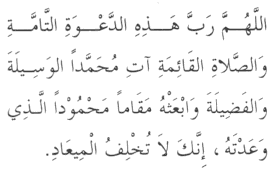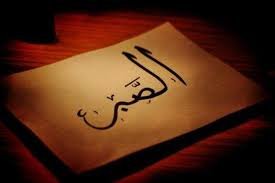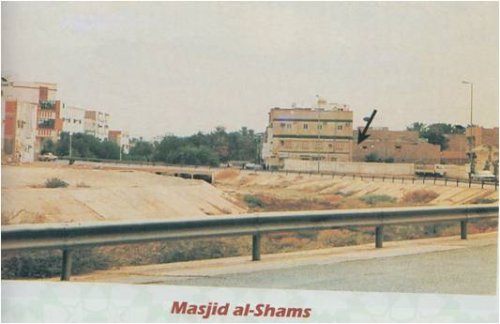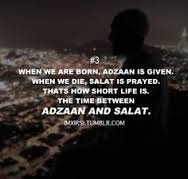-
Posts
8,462 -
Joined
-
Days Won
773
Content Type
Profiles
Forums
Events
Everything posted by ummtaalib
-
Patience & Gratitude By Ibn Qayyim al-Jawziyyah What scholars have said about patience Different degrees of patience Obligatory patience (wâjib) Encouraged patience (mundûb) Forbidden patience (mahdhûr) Disliked patience (makrûh) Permissible patience (mubâh) & A Lot More
-
Surah al-Baqarah, Verse 153 (Ma'ariful Qur'an, Volume 1, Mufti Muhammad Shafi rahmatullahi alaih) "O you who believe, seek help through patience and prayer. Surely, Allah is with those who are patient." (2:153) As we have already seen, the enemies of Islam have been objecting to the change in the orientation of Qiblah, wishing to produce in the minds of the people doubts about the validity of Islam as a religion. The earlier verses have, in answering these objections, removed all such misgivings. But some of the enemies simply ignored the answers, and still persisted in their hostility. This situation was likely to dishearten the Muslims. So, the present verse nullifies such a reaction on the part of the Muslims by prescribing the method of overcoming one's grief or anxiety. The Patience And The Salah And the method consists in turning to patience and prayers; for Allah assures us here that He is with those who are patient. This promise applies, above all, to those who offer prayers, whether fard (obligatory) or nafl (supererogatory), for prayers are the supreme form of worship. In explaining the context, we have mentioned a specific situation, but the verse, in fact, identifies the elixir for all the ills which are a necessary part of human existence, whether they be wants and needs, or anxiety and suffering. The Holy Qur'an itself has indicated; in a very subtle and eloquent way, the general efficacy of this remedy by employing a generalizing expression - "seek help" - without specifying the situation in which help is to be sought. (Mazhari) Now, the two ingredients of this remedy are patience and prayers. The Arabic term Sabr (sabr) is much more comprehensive than its usual English equivalent, "patience". Lexically, the word "Sabr" signifies "restraining oneself, or keeping oneself under control." In the terminology of the Holy Qur'an and the Hadith, Sabr has three modes:- 1) Restraining oneself from what the Shari'ah has declared to be illegal or impermissible (Haram). 2) Forcing oneself to be regular in the observance of the different forms of worship and to be steadfast in obeying the commandments of Allah and the Holy Prophet Sallallahu 'Alayhi Wasallam: Peace be upon him. 3) To endure all kinds of trouble and pain - in other words, to understand clearly and to believe that it is the will of Allah to make one suffer, and to hope that one shall receive a reward for this suffering. With regard to this last point, let us add that, on the authority of the commentator Sa'id Ibn Jubayr, Ibn Kathir says that if one cannot help uttering a word of grief or a sigh of pain, it does not go against Sabr, or nullify it. People generally identify Sabr with the third mode alone, and ignore the first two which are, indeed, more basic and essential. We cannot insist too much on the fact that all the three are equally obligatory, and that every Muslim is required to practice all the three forms of Sabr. In the terminology of Holy Qur'an and the Hadith, Al-Sabirun is the title of those who are steadfast in observing all the three forms with equal rigour. According to the Hadith, people will hear a call on the Day of Judgment, "Where are the Sabirun?"; at this, those who had been constant in observing the three forms of Sabr will stand up, and they will be allowed to enter Paradise without having to present the account of their deeds. In citing this hadith, Ibn Kathir (rahmatullahi alaih) points out that it is corroborated by the Holy Qur'an itself: Say, "O My servants who have believed, fear your Lord. For those who do good in this world is good, and the earth of Allah is spacious. Indeed, the patient will be given their reward without account." (39:10) As for the second ingredient of the prescription, it is Salah (Prayer). Although Sabr, as we have just explained it, covers the different forms of worship, including prayers, all of them being its branches. Salah, however, has been mentioned separately, because that is the most perfect model of Sabr. For, in the state of Salah, one binds oneself to obedience and worship, and restrains oneself not only from all that is sinful or reprehensible but even from what is otherwise permissible - e.g., from eating or drinking or talking. Hence, Salah is a visible demonstration of Sabr which signifies keeping oneself under control in shunning everything sinful and in submitting oneself totally to obedience. A Remedy To All Problems Moreover, Salah does possess a special efficacy in releasing man from all kinds of trouble and pain, and in fulfilling all his needs. We may not be able to explain it rationally, but the efficacy is present as a characteristic quality in the very nature of prayers - as happens in the case of certain medicines too. But the efficacy shows itself only when prayers are offered in the proper way and according to the physical and spiritual etiquette laid down by the Shari'ah. If our prayers seem to be fruitless, it is because we have been deficient in observing this etiquette, and have not turned to Allah 'azza wa jal in single-minded devotion and total submission. Let us not forget that, according to the Hadith, whenever the Holy Prophet Sallallahu 'Alayhi Wasallam: Peace be upon him was faced with a grave problem of any kind, he always hastened to offer nafl prayers, and through the barakah (benediction) of the prayers Allah came to his aid and resolved the problem satisfactorily. As to how Sabr can save man from all kinds of trouble and pain and resove all his difficulties, the secret has been revealed in the last phrase of this verse - "Surely, Allah is with those who are patient." That is to say, as a reward for Sabr man receives the honour of the "company" of Allah. And it goes without saying that when the might of the Lord of the Worlds Himself has come to the aid of a man, what pain or trouble can overcome him, and who can prevent his concerns from prospering?Source
-
Meaning of the word Sabr (More Indepth) Q. I would like to find out what is meant islamically by the word sabr ( patience / perseverance A. The following is some information on Sabr (Patience). Allah Says in the Holy Quran: ” O ye who believe! Be patient and out do all others in endurance” (3:200) The term sabr is commonly translated as patience, but this is only an approximate meaning which does not convey totally the true meaning of sabr. ‘Patience’ comes from a Latin root, meaning ‘suffering.’ – a very negative type of idea. Sabr however comes from the root sabr which means to tie, or in other words to tie down uncontrolled feelings of fear or weakness. Some equivalent English words would therefore be perseverance, fortitude, resolution, self-discipline and control. Far from being a negative moral virtue, it is an active, determined and dynamic quality which Islam encourages for all believers. It therefore requires that Muslims fight for justice and freedom against human tyranny and it also requires Muslims to be steadfast in the face of calamity. There are six major applications of the quality, of sabr (patience and perseverance) in the life of a Muslim. (1) First of all, the Quraan links perseverance with obedience of Allah. As the Quraan states “Lord of the heavens and of the earth and of all that is between them; so worship Him and be constant and patient in His worship.” (2) Perseverance in keeping away from things which are bad is enjoined on Muslims by both the Quraan and the sayings of the Prophet (S.A). The Prophet (S.A), for example said: “Paradise is surrounded by things which are trying and difficult, whereas hellfire is surrounded by things which are pleasing and glittering”. (3) In several places, the Quraan call upon both Prophet Muhammad (8.4) and the believers to practice resolution and perseverance as a moral virtue in itself. As the Quraan says: “Therefore be patient with constancy to the command of thy Lord and harken not the sinner or the ingrate among them” (76:24). (4) Perseverance and patience in the face of calamity and misfortune is enjoined on the believers. As the Quraan says:” ” And bear with patience whatever befall thee for this is firmness in the conduct of affairs…” (31:17) (5) Muslims are advised to persevere their friendships with those who are pious and good, but not with those people who are after the glitter of this life and are therefore not truly believers. As the Quraan says: ”And keep thy soul content (i. e. tie-down your souls) those who call on their Lord morning and evening seeking His pleasure.” (18:28) (6) We are advised to practice perseverance in our faith even when good fortune befalls us. As the Quraan says: “If we give man a taste of our mercy and then withdraw it from him, behold! He is in despair and falls into blasphemy.” (ll:9) But if we, give him a taste of (our) favors after adversity hath touched him, he is sure to say ‘all evil has departed from me’: Behold! He falls into arrogance and pride” (11:10) ‘Except those who show patience and constancy and work righteousness; for them is forgiveness and a great rewards” (11:11) The Prophet (S.A) himself said: “How excellent is the case of a faithful servant, there is good for him in everything and this is not the case with anyone except him. If prosperity reaches him, he expresses gratitude to Allah and that is for him and if adversity befalls him, he endures it patiently and that is better for him.” (Muslim) Thus, the Islamic moral virtue of sabr is a much broader term than patience. The question will arise; why does the pious and good seem to face ‘all calamities without reward?’ To answer this, we must understand that no one is in a position to judge Allah’s ultimate wisdom. When so many things in life appear self-contradictory – for instance pious people suffering calamities, the human being is apt to forget that beyond the limited human judgement, there is a higher order of justice and wisdom which no human being is qualified to judge. The Quran indicates that it is not only the evil, and wicked people who are touched by calamity in this world. Allah ordains hardship on the believers also. Similarly, bounty is given not only to the good but also to the wicked. The Quraan explains this apparent contradiction by saying that people wi1l not be left to just profess their belief and faith without being tested with trials and difficulties and even disaster in order to ascertain the sincerity of belief. As the Quraan says: “And we shall surely test you with fear and hunger, and loss of wealth and lives and fruit, and give glad tidings to the patient ones’. (2:156) Another explanation for the seemingly suffering hardship of believers was given by the Prophet (S.A) when he said that if Allah loves a person a lot, he will try him with difficulty. In addition, he said in another hadith that Allah sometimes punishes a person for his sin in this life so that on the Day of Judgement he will not face eternal punishment. Muslims are encouraged to look upon calamity and trials as perhaps good in the long run, but this does not mean that the believer should actually go out and seek hardship. There is a difference between the person who is patient, constant and steadfast in the face of difficulty, and the person who actively seeks calamity and disaster. The Prophet (S.A) has set an example in this regard by counseling his followers, who were on their way to the battle front to defend Islam, that they should not be eager for the fight and should pray that it be averted: however, if fighting is inevitable, then they should show courage and perseverance. It is reported that the Prophet (SA) saw a very old man on pilgrimage walking but supported by his sons. When the Prophet (SAS) questioned the party he was told by the old man’s sons that their father had taken a covenant that he would endure the difficulty of walking all the way to Mecca. The Prophet (S.A) said “Allah does not need that from you “, and, ordered the man to ride in comfort. The moral virtue of perseverance is related to several of the other moral virtues in Islam, for example it is related to: (a) The quality of Taqwah or piety that is, those who have a Taqwah also practice sabr. (b) Forgiveness, it is obvious that those who practice patience will also be forgiving and will not carry a grudge. Muslims are allowed the right of retaliation but the Quraan says that patience and forgiveness is better. Allah says: “But indeed whosoever bears wrong with patience and forgives, that would truly be an exercise of courageous will and resolution in the conduct of affairs.” © Gratefulness to Allah for His bounties. (d) Trust, confidence and dependence upon Allah. (f) Jihad (struggle) in the path of Allah. (g) Mercy, because those who have the quality of sabr are compassionate to one another. The benefits and rewards of sabr are many. First of all quality of patience is one of the main characteristics which distinguishes the prophets from other people. The Quran goes on to say that the believers who practice sabr will be granted forgiveness and a great reward Allah says: “Verily the patient ones —shall have their reward without measure” (39:11) The quality of constancy or perseverance is also a pre-requisite for spiritual leadership in Islam, and the Quraan gives glad tidings of great rewards for those who practice patience in their lives. The-Prophet (S.A) described perseverance as a light of the believers and as-half of the faith. Islam teaches that if the following attitudes are inculcated, one’s quality of sabr will be increased: (a) Strengthen, faith and trust in Allah, as the owner and possessor of the entire universe. He who has knowledge, wisdom and justice totally beyond our comprehension. (b) Have the idea that Allah gave everything and so if He wills, he can take this property back. © Everything that happens, has been decreed by Allah before the creation of the earth, and so, even if the whole world gathered to benefit or harm a person, it would not happen unless Allah so willed. (d) Realize that difficulties may be an atonement for sins and so persevere through them. (e) In all cases of difficulty, turn to Allah and pray to Him for support in the face of adversity. And Allah knows best. Mufti Waseem Khan Source
-
Virtues of Sabr Sabr - Most Precious Gift to a Mu'min One of the great results and precious fruits of our freedom and emancipation from servitude to our carnal self is patience in calamities and misfortunes. In other words, Sabr means restraining ourselves from complaining about hidden anguish. Sabr produces many excellent results, among which is the soul's training and discipline. Sabr in regard to obedience [ta'at] is the source of intimacy with Almighty Allah Jallah Wa'ala. And Sabr in misfortunes is the source of rida or contentment with Divine destiny and decrees. These are the stations of the faithful [ahl-al-Imaan] or rather those of the Gnostics [ahl-al-Irfan]. It is said that Sabr is to faith what the head is to the body. The body perishes without the head, and so when Sabr goes faith also disappears. The accounts of the lives of the Ambiya Alayhim Salaam from Nabee Adam Alayhis Salaam to our Beloved Nabee Muhammad Sallallahoo Alayhi Wasallam reveal that although their stations were over and above the stations of Sabr, rida and taslim [surrender], they never stopped supplicating, lamenting and confessing their needs to Almighty Allah Subhanahu Wata'ala and this is not contrary to their spiritual stations. Remembering Almighty Allah Azza Wajjal, cherishing the intimacy of solitude with the Exalted Beloved, and expression of servitude and humility in front of His absolute perfection and greatness is the ultimate end of the hopes of the mystics [arifun] and the final destination of the journey of the wayfarers [salikun]. Sabr is the key to the gates of felicity and the main means of deliverance from the mortal perils. Sabr makes a human being bear calamities with ease and face difficulties with composure. Sabr strengthens the will and the power of resolution. Sabr brings independence to the dominion of the soul. Anguish and anxiety on the other hand, aside from their shameful character, are symptoms of the soul's weakness. They deprive one's being of its stability, weaken the determination, and enfeeble the intellect. "Sabr restrains the inner being from anguish, the tongue from complaint and the bodily members from untoward movements." There are various degrees and levels of Sabr, and its reward and merit vary in accordance with its degree and level. This is revealed by the following tradition as narrated by Hazrat Ali Radhiallahu Ta'ala Anhu: Hazrat Ali (Radhiallaahu Anhu) said: "The Messenger of Almighty Allah Azza Wajjal said, Sabr is of three kinds: Sabr in regard to disobedience. One who bears patiently with affliction, resisting it with a fair consolation, Allah writes for him or her three hundred degrees [of sublimity], the elevation of one degree over another being like the distance between the earth and heavens. And one who is patient in regard to obedience, Allah writes for him or her six hundred degrees [of sublimity], the elevation of one degree over another being like the distance between the earth's depths and the Throne [al-Arsh]. And one who is patient in regard to disobedience, Allah writes for him or her nine hundred degrees [of sublimity], the elevation of one degree over another being like the distance between the earth's depths and the furthest frontiers of the Arsh [Throne]." This noble tradition reveals that Sabr in regard to disobedience is superior to the other levels of Sabr, for it not only possesses greater number of degrees but also the range between its degrees is greater than those of the other kinds. It also shows that the extent of Paradise is much greater than what can come into our imagination, for our vision is limited and confined. That which has been said as a description of Paradise that: [part of verse 21 of Surah Al-Hadid] "And a Garden the breadth whereof is as the breadth of heaven and earth." perhaps refers to the Paradise of deeds. That which has been referred to here in this most beautiful verse is the Paradise of character and the criterion in the Paradise of character is the strength and perfection of will. Hence its extent should not be confined within any limits. Almighty Allah Subhanahu Wata'ala informs us with words of wisdom and with the expression of truth in verse 45 of Surah Al-Baqara: "Nay, seek Allah's help with patient perseverance and prayer; It is indeed hard, except to those who bring a lowly spirit." The Arabic word Sabr implies many shades of meaning, which is impossible to comprehend in one English word. It implies (1) patience in the sense of being thorough, not hasty; (2) patient perseverance, constancy, steadfastness, firmness of purpose; (3) systematic as opposed to spasmodic or chance action; (4) a cheerful attitude of resignation and understanding in sorrow, defeat, or suffering, as opposed to murmuring or rebellion, but saved from mere passivity or listlessness, by the element of constancy or steadfastness. Almighty Allah Subhanahu Wata'ala then informs us in Verse 153 of Surah Al-Baqara of the reward awaiting those who display Sabr: "O you who believe! Seek help with patient perseverance and Prayer: for Allah is with those who patiently persevere." What then can be a greater reward for patience, perseverance, self-restraint and constancy than that Almighty Rabbul Ala'meen should be with us? For this promise opens the door to every kind of spiritual wellbeing. The "patient perseverance and prayer" mentioned is not mere passivity. It is active striving in the way of truth, which is the way of Almighty Allah Jallah Wa'ala. If a Mu’min bears patiently with misfortunes and calamities and seriously endures the hardships entailed by worship and rites and the bitterness arising from the renunciation of carnal pleasures, and if he or she does all this for the Pleasure of Almighty Allah Jallah Wa'ala, his or her soul gradually becomes accustomed to these things. The Righteous are patient in Constant Devotion: Almighty Allah's Way is open to all: whosoever has the Will may attain to the Perfect Goal as promised by Almighty Rabbul Ala'meen in verse 12 of Surah Al-Insan: "And because they were Patient and constant, He will reward them with a Garden and (garments) of silk." Almighty Allah Azza Wajjal tells us with words of wisdom in verses 155 - 157 of Surah Al-Baqara: "And surely We shall try you with something of fear and hunger and loss of wealth and lives and crops; but give good tidings to the steadfast. Those who say, when a misfortune striketh them: Lo! We are Allah's and lo! unto Him we are returning, such are they on whom there are blessings from their Lord, and mercy, such are the rightly guided." When something unpalatable happens or we come across troubles or deprivations, we are naturally inclined to resist the onslaught of the happenings, and when resistance be of no avail, we may lose heart. On such occasions Sabr (patience) comes in as a handy remedy prescribed by Almighty Allah Subhanahu Wata'ala, to act as an anti-toxin to the poisons of mishaps. The ordeal is not so afflicting as the sense of it. But when one is accustomed to bear things with Sabr and surrenders oneself to the Will of Almighty Allah Jallah Wa'ala, a great deal of the adverse effect of tribulation vanishes away. "O ye who believe! Seek help in steadfastness and prayer. Lo! Allah is with the steadfast." [surah Al-Baqara Verse 11]. When one mediates over the significance of the above verses that for such unhappy occasions, Almighty Rabbul Ala'meen has prescribed Sabr (patience) as the most handy weapon to ward off evil effects of the mishaps etc; it acts as a neutralizing agent to the poisonous reactions of adverse circumstances. The affliction is not so grueling as the sense of it. But when one cultivates the habit of patience and steadfastly bears things resigning to the Will of Almighty Allah Azza Wajjal, his or her whole psychological set up of mind undergoes a great change. It is a sublime philosophical teaching of Islam that teaches one to resign and surrender oneself to the Will of Almighty Allah Azza Wajjal. When a Mu’min is convinced that "Rabbul Ala'meen - Exalted is with the steadfast", it gives him or her great consolation and comfort. Such contemplation no doubt mitigates his or her sufferings. Thus Sabr is the elixir of all ills and an anti-toxin of all mishaps, hardships and failures etc. The full meaning of Sabr is to be understood here viz.: Patience, perseverance, constancy, self-restraint, refusing to be cowed down. These virtues we are to exercise for ourselves and in relation to others; we are to set an example, so that others may vie with us, and we are to vie with them, lest we fall short; in this way we strengthen each other and bind our mutual relations closer, in our common service to our Glorious and Exalted Creator as shown to us in verse 200 of Surah Al-Imran: "O you who believe! Persevere in patience and constancy; vie in such perseverance; Strengthen each other; And fear Allah; That you may prosper." Prosperity [Falah} in this verse is to be understood in a wide sense, including prosperity in our mundane affairs as well as in spiritual progress. In both cases it implies happiness and the attainment of our wishes, purified by the love of Almighty Allah Subhanahu Wata'ala. Almighty Allah Jallah Wa'ala declares to us in verse 115 of Surah Hud: "And be steadfast in patience; For verily Allah will not suffer the reward of the righteous to perish." A Mu’min must be patient with what seems to be evil all around. That does not mean that we should sit still and do nothing to destroy evil; for the fight against evil is one of the cardinal points of Islam. What we are told is that we must not be impatient. We must pray to our Glorious and Exalted Creator and commune with Him, so that our patience and faith may be strengthened. "Almighty Allah's Grace and Help are ever ready for His servants who patiently persevere. Let not arrogance blind the souls of men. The Hour of Judgement is bound to come. The keys of Life and Death Are in the Hands of Allah. Dispute not the Signs of Allah, but learn from history And the world around you. Science and skill avail you not if the soul is dead." [synopsis of Surah Ghafir Verses 51 to 85]. What then can we do to make Almighty Allah's Light shine forth through the darkness around us? We must first let it shine in our own true selves with that Light in the niche of our inmost hearts we can walk with steps both firm and sure: We can humbly visit the comfortless and guide their steps. Not we but the Light will guide. But oh! The joy of being found worthy to bear the Torch, and to say To our brethren: "I too was in Darkness, Comfortless, and behold, I have found Comfort and Joy in the Grace Divine." askimam
-
It was narrated that Anas (may Allah be pleased with him) said: The Messenger of Allah (peace and blessings of Allah be upon him) said: “Du’a is not rejected between the adhan and iqamah, so engage in du’a (supplication).” [Tirmidhi]
-
Making Dua' After Adhaan. During his recent visit to Zambia, Shaykhul Hadeeth Mawlana Muhammad Saleem Dhorat Saheb Hafizahullah shared a beautiful gem with us! He mentioned that we have been advised by the Prophet salalahu Alayhi wasallam to make Dua' for Him, only once. When is that? After Adhaan! What Dua do we pray? Allahumma Rabba Haathihi da'wati taammati wassalaatil Qaaimati aati muhammadanil waseelata wal fadheelata wab'ath hu maqaamal Mahmoodanillathi wa'attahu. Innaka laa tukhliful mee'aad. O Allah, Lord of this perfect call and this everlasting Salaah, grant Muhammad salalahu Alayhi wasallam the right of intercession and honour and raise him to the laudable position which You have promised him. Surely, You do not break promise. Ever Wondered why the Prophet salalahu Alayhi wasallam chose the time after Adhaan? The Prophet salalahu Alayhi wasallam knew that at this time, Duas are readily accepted, therefore He salalahu Alayhi wasallam chose THIS time!
-
Note that this dua has variations Imam Bukhari (Rady Allahu anhu) related on the authority of Jabir (Rady Allahu anhu) that the Prophet Muhammad said whoever recites the following supplication after the Adhan shall get intercession on the Day of Judgment. The supplication is: اللهم رب هذه الدعوة التامة والصلاة القائمة آت محمدا الوسيلة والفضيلة وابعثه مقاما محمودا الذي وعدته “O Allah! Lord of this complete call and established prayer give Muhammad the position and distinction, and give him the praised station that you have promised. Allahumma hadhihi al-da’wat al-taammah wa al-salaat al-qaa’imah ati Muhammadan al-waseelata wa al-fadeelata waba’th hu maqaaman mahmudan alladhee wa’adta.” (Sahih al-Bukhari 1/160)
-
-
Three Levels of Sabr by Shaykh Husain Abdul Sattar Sabr is a very specific act, and can be defined in three ways: Although sabr has deeper levels, the basic principle of sabr is of sabr fil’musibah (having sabr in the face of difficulty). This is the type of sabr most people understand. This is when you show patience in the event of some difficulty. We all undergo difficulties, but the distinguishing factor is how we deal with them. Some people will get upset and continuously complain, but the believers will see difficulty as an opportunity to worship Allah swt, they will exhibit a calmness and say alhamdulilah (all praise is to Allah) for the chance to come closer to Him. They’ll say innallahi wa ina’ilahi rajioun (from Allah we came and unto Him is our return). Whatever we lost in the difficulty, it came from Allah سبحانه و تعالى anyway so it ultimately doesn’t matter because we all have to go back to Him. Another level of sabr is sabr an’nil masiah (having the sabr to restrain from sin). When the believer is faced with the opportunity to do sin, he will immediately turn away from it. This will require a certain sabr, a certain restraint, because the chance to do sin is all around us. It’s easy to log onto the computer and engage in a variety of sin, it’s easy to sit with two people and talk about a third. The third level of sabr is sabr a’la taha (sabr in the acts of worship). There are inevitably times when a person feels excited to do a certain act of worship. If you’re in the masjid and everyone is praying maghrib, it’s easy to be excited for the one short period of time, but you have to pray maghrib 365 days of the year. To develop a consistency in our routine, to patiently do our good deeds and worship without fail requires a deep sabr. These are the three types of sabr the saalik (the seeker) must work to establish. Everyone is in different circumstances, some people don’t have the strength to pray abundantly, but they are able to be free from sin. Other people are able to face problems with great patience but don’t engage is extra worship. At the least, however, we should all abstain from committing sin. This is the least part of our sabr, and without sabr it will be very difficult to attain mayi’ah. Source
-
Definition From Ma'ariful Qur'an, Volume 1, Mufti Muhammad Shafi rahmatullahi alaih The Arabic term Sabr (sabr) is much more comprehensive than its usual English equivalent, "patience". Lexically, the word "Sabr" signifies "restraining oneself, or keeping oneself under control." In the terminology of the Holy Qur'an and the Hadith, Sabr has three modes:- 1) Restraining oneself from what the Shari'ah has declared to be illegal or impermissible (Haram). 2) Forcing oneself to be regular in the observance of the different forms of worship and to be steadfast in obeying the commandments of Allah and the Holy Prophet Sallallahu 'Alayhi Wasallam: Peace be upon him. 3) To endure all kinds of trouble and pain - in other words, to understand clearly and to believe that it is the will of Allah to make one suffer, and to hope that one shall receive a reward for this suffering. With regard to this last point, let us add that, on the authority of the commentator Sa'id Ibn Jubayr, Ibn Kathir says that if one cannot help uttering a word of grief or a sigh of pain, it does not go against Sabr, or nullify it
-
Qur'anic Verses related to Patience “Nay, seek Allah’s help with patient perseverance and prayer; It is indeed hard, except to those who bring a lowly spirit.” (2:45) “O you who believe! Seek help with patient perseverance and Prayer: for Allah is with those who patiently persevere.” (2:153) ”And bear with patience whatever befall thee for this is firmness in the conduct of affairs…” (31:17) ”O ye who believe! Be patient and out do all others in endurance” (3:200) Ahaadith related to Patience “How wonderful is the affair of the believer, for his affairs are all good, and this applies to no one but the believer. If something good happens to him, he is thankful for it and that is good for him. If something bad happens to him, he bears it with patience and that is good for him.” (Muslim) “…whoever is patient Allaah will bestow patience upon him, and no one is ever given anything better and more generous than patience.” (Muslim) “There is no Muslim who is stricken with a calamity and says what Allaah has enjoined – ‘Verily to Allaah we belong and unto Him is our return. O Allaah, reward me for my affliction and compensate me with something better’ – but Allaah will compensate him with something better.” (Muslim)
-

Attaining fina-e-qalbi: Annihilation of the Heart
ummtaalib replied to ummtaalib's topic in Matters of the Heart
I think you'll have to ask those who have seen Him : ) -

Attaining fina-e-qalbi: Annihilation of the Heart
ummtaalib replied to ummtaalib's topic in Matters of the Heart
The answer is here in the first quote in my post... Mulla Ali al-Qari (Allah have mercy on him) states in his renowned Sharh Fiqh al-Akbar: “The majority of the scholars are of the view that the vision of Allah Most High in sleep is possible, without any given description of modality (kayfiyya), direction (jiha) or quiddity (hay’a) and in the second quote: Imaam al-Daarimi said, in his refutation of Bishr ibn Ghiyaath, “This seeing took place in a dream, and in a dream it is possible to see Allaah in any shape or form.” (p. 166) Read the whole of part b in the article at the source... here inshaAllah you will understand -
Masjid Ash-Shams It is in the Qubaa area and so named because being on a higher place than the surrounding buildings, the sun rises on it first. It is the place where the Prophet sallallaahu 'alayhi wasallam had his tent pitched during the siege of the Jewish tribe of Bani An-Nadhir (From "Memories of the Luminous City")
-
Umar RA once said, “The one who speaks a lot commits a lot of mistakes. The one who makes lots of mistakes commits lots of sins. The one who commits lots of sins will have the Hell-fire as the first place for him."
-
“Whoever believes in Allah and the Last Day should speak good things or keep silent...." Part of a hadith [bukhari and Muslim]
-
Mujahid Brother Dawood (Shaheed Inshallah) Dawood, from Britain. Killed during a battle against Croatian Forces in Bosnia in 1993. Aged 29. 1st hand account. Present on In the Hearts of Green Birds Born and brought up as a Christian in Britain, he started his job in a Computer Company. One morning he came to work wearing Islamic dress. Upon being asked why he was wearing this dress he informed his work colleagues that he had converted to Islam. One week later he was fired from his job and went to Bosnia with two other brothers. Four months later, his brothers were returning to Britain for a few months and they asked him to come with them. He refused, saying, What is there for me to do in the land of disbelievers? He was a very calm and quiet brother, funny at the same time. He loved guarding his brothers on the mountain in snow and cold weather. A very fast learner of Islam and the Arabic language, he loved to keep all the Sunnahs of the Messenger of Allah (SAW). He used to sleep on his right-hand side in a crouched position, he used pray all night and fast most days. Commander Abul-Harith (RA) said about him, All of us knew that Dawood would be the next Shaheed from amongst us, as he was getting higher and higher and higher in his Iman and Taqwa. The night before the Operation, Dawood had a dream, in which he saw himself running in a place with large palaces on either side. He asked, Who do these palaces belong to? It was said to him, These are the houses of the Shuhadaa. He asked, Where is the house of Abu Ibrahim? (the Turkish brother from Britain who was shot dead by the French United Nations near Sarajevo Airport). The voice said to him, The house of Abu Ibrahim is over there. And so in the dream Dawood began to run towards the house of his friend, Abu Ibrahim, and then suddenly he fell down and woke from his sleep. The following morning there was a large operation against the Croats. During this operation, while he was running, he was killed by a single shot to the heart. He fell down and his body rolled down to the Croat bunkers below. After three months his body was returned to the Mujahideen. It was as new, it was bleeding and smelling of musk. His body was found crouched on its right-hand side, just how he used to lie down to sleep. (Story courtsy of WWW.AZZAM.COM)
-
More answers here: What Takes a Person Out of the Fold of Islam? - seekersguidance














